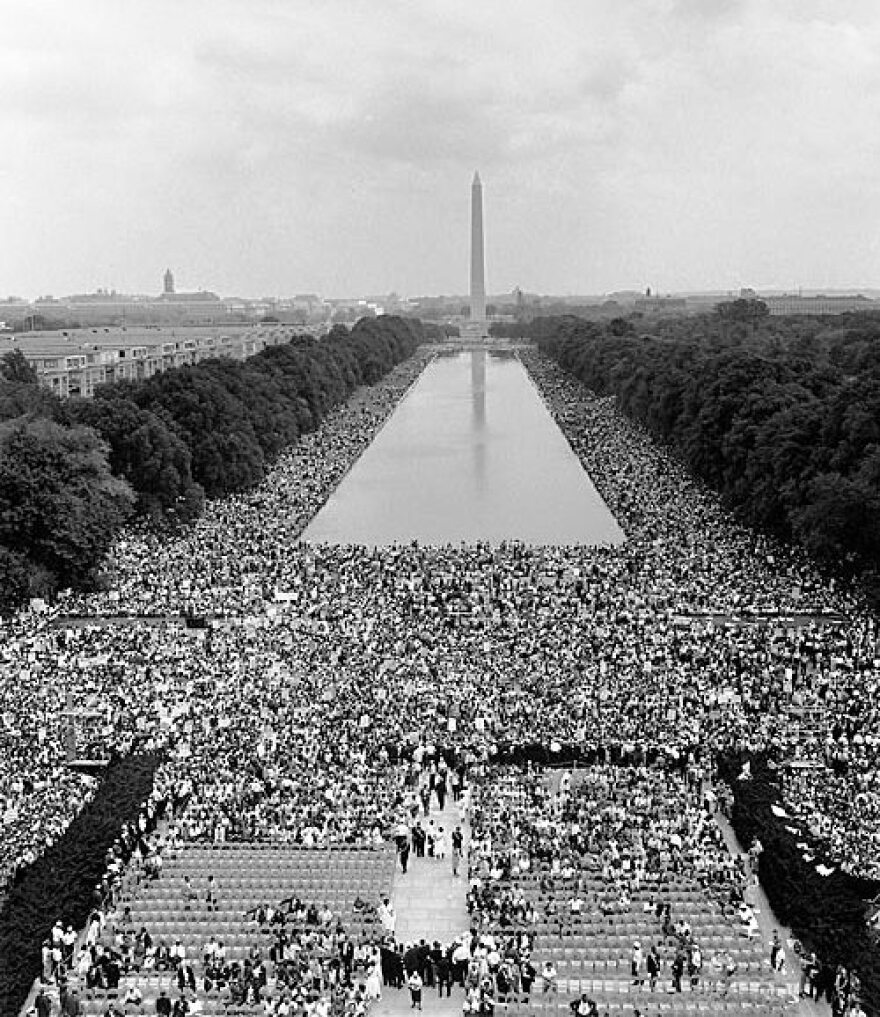On this day 50 years ago, Dr. Martin Luther King Jr. gave his famous "I Have a Dream" speech to a crowd of over 200,000 civil rights supporters from the steps of the Lincoln Memorial during the March on Washington for Jobs and Freedom. Commentator and Murray State History Professor Dr. Brian Clardy reflects on this defining moment of the Civil Rights Movement, and it's cultural significance then and 50 years later.
On a hot and sweltering Summer of 1963 afternoon, the Reverend Dr. Martin Luther King, Jr. delivered one of the most popularly quoted speeches in American history. It was given towards the end of the historic March on Washington for Jobs and Freedom where nearly a quarter of a million non-violent demonstrators gathered under their First Amendment guarantees of peaceable assembly to present a grievance to their government to protest for first rate citizenship rights.
The speech was known for its sweeping oratory, with a few lines standing out and quoted frequently. Dr. King’s quotation of the Declaration of Independence echoed the essence of the social contracts musings on “life, liberty and the pursuit of happiness,” but the lines that preceded it are more reflective of the speech’s revolutionary nature. Channeling the early Founders of the United States, King warned of dire consequences should the segregated status quo remain intact. He chided:
"It would be fatal for the nation to overlook the urgency of the moment. This sweltering summer of the Negro's legitimate discontent will not pass until there is an invigorating autumn of freedom and equality. Nineteen sixty-three is not an end, but a beginning. And those who hope that the Negro needed to blow off steam and will now be content will have a rude awakening if the nation returns to business as usual."
This oft-neglected portion of the speech reflected the more practical elements of non-violent protest movements. An astute student of the writings of Mahatma Gandhi , Henry David Thoreau, and the mystical theologian Howard Thurmann, King believed that if dissent were channeled into creative non-violent protest that the likelihood of any movement disintegrating into an orgy of unrestrained mayhem would be nil. Moreover, King’s theological training informed the speech in its appeals to revolutionary Christian ideals, like that of Paul and later intellectuals like Reinhold Niebuhr and Walter Rauschenbusch.
Dr. King’s clarion call for racial equality was also buttressed by an appeal for racial collaboration and harmony……….a harmony that showed the connection between the freedom and liberation of the human spirit and the acquiescence of basic legal rights.
But the most frequently quoted portion of the speech, must also be put into context, in terms of its rhythm, delivery, and its roots that harken back to the homiletical style of Sacred Rhetoric that is a staple of the Black Church tradition. Dr. King first heard the rhytymic phrase, “I Have a Dream” from a young and enterprising preacher named Prathia Hall at a rally about a year before the 1963 March……and King had given a truncated version of the speech in various cities. However, Dr. King used the ebb and flow of the phrase in order to succinctly describe the movement’s aims and objectives by incorporating the Old Testament prophecy and the idealism of the Social Gospel. He said:
"I have a dream that one day every valley shall be exalted, and every hill and mountain shall be made low, the rough places will be made plain, and the crooked places will be made straight; 'and the glory of the Lord shall be revealed and all flesh shall see it together.'"
Fifty years have come and gone since that historic moment in American oratory. And, for the most part, many of the aspects of the “dream” have become reality. But in order to make sure that that spirit of idealism continues uninterrupted, it is absolutely vital to understand the nature and scope of the entire speech……the place it into its proper context…….and to appreciate its contemporary and practical meaning.
--
Dr. Brian Clardy is an Assistant Professor of History and Coordinator of Religious Studies at Murray State University. He is also the Wednesday night host of Cafe Jazz on WKMS.






